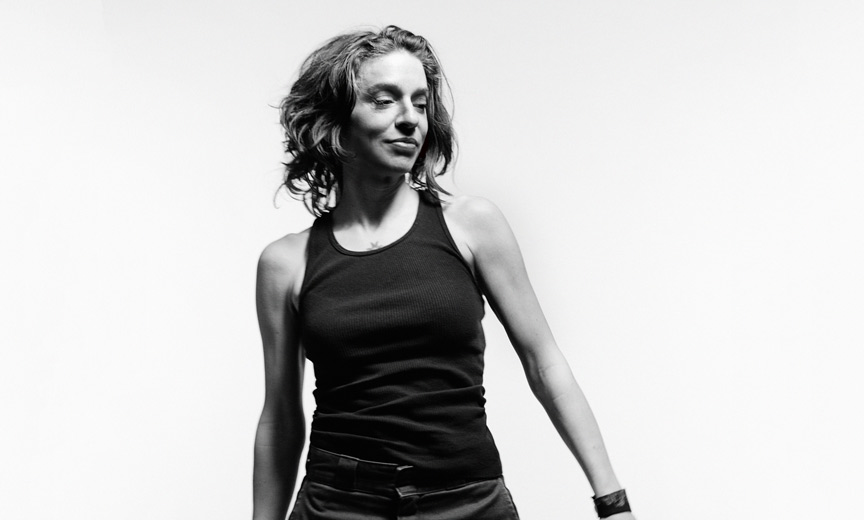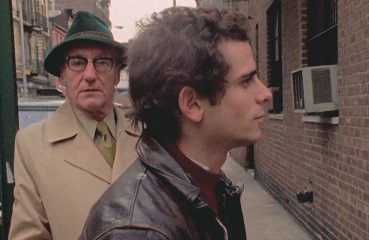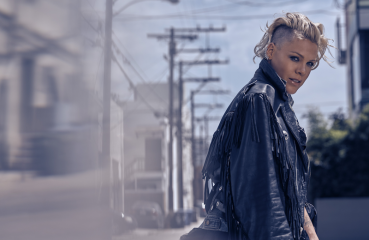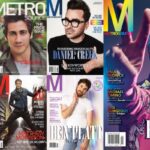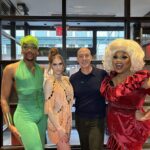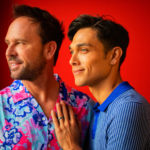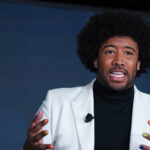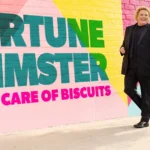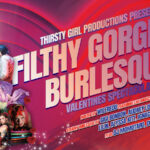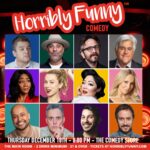Twenty albums into an unprecedented career, the singular singer-songwriter shares how she crafts her music and connects with the people who love it.
Ani DiFranco formed a record label (now Righteous Babe Records) when she was barely 19, racked up a string of chart hits, including “32 Flavors”, “Both Hands” and “Little Plastic Castle,” then won a Grammy for her 2004 album Evolve. Openly bisexual, DiFranco has sung candidly about relationships with both men and women with apparent indifference to fluctuating social and political norms. This year, as she unveils her twentieth album, Binary, she speaks candidly about her fans, her process and her hopes for the future.
METROSOURCE: You’ve meant so much to so many for so long.
ANI DIFRANCO: Thanks, pal. That’s sweet of you to say. It’s been really cool to be on such a long road with so many people. You know, these days my life is just resplendent with faces that come up to me and go: “For the past 20–30 years I’ve been going with you, and we did all this s**t together: we were up, we were down.” And it just makes me feel so much less alone in the world. We have accompanied each other on this journey.
You seem to have a really unique connection with your fans.
It’s taken many forms over the years. There was a time in the late ‘90s when it was kind of overwhelming and menacing. When you hit this level of celebrity that I touched upon, you get a lot of energy coming back at you. … I think that my life and career in music has gone way past that. There was a moment when the music press noticed me and put me on the cover of their magazines and then that moment passed. Now I hit this zone or stasis where the connections I do make and retain with people are really sincere, grounded and deep with both of us. The interactions I have with the listeners are meaningful and really propel me. They give my life meaning on those days when I need reminding of why I need to go on.
Read Next | Wait No More: Lesbian Poet Kaitlyn Finn Publishes “I Wrote This 4 u”
As a songwriter, how do you break open the themes that you’re working on in such a clear and visceral way?
It’s funny. I’m working on a memoir and was actually just sitting here thinking about the writing process. What I’ve found myself thinking about is: My songwriting process takes many forms, and not accidentally. I think intentionally. I don’t want to write the same song twice. There’s something in me that wants to keep breaking ground, even though that’s not the path to total success. Experimentation leads to all kinds of blind alleys. I think one thing I’m really grateful for is my audience’s patience and forgiveness. I’m all about the process; the failures can be equally as interesting. Any listener that has hung on for any amount of time is open to that process. They’re not just waiting for the same thing, they’re not like, “Ooh, that’s the money shot!” every time. They’re along for the ride. I really love that about my audience; they keep taking curve balls. I try to keep changing it up. A song could start with a line or a groove or a mood, a color or a hue, and the process has taken any time or form that it can. Some of them come quickly, and they’re vital, and others take f**king months and months of labor and patience.
Your Next Bold Move
As we move into 2018, do you have any hopes to share?
I hope we can all continue investing energy and love into the resistance. I think this is a very hopeful time. A lot of people who were sitting down are getting up. They’re realizing enough is enough. This society is not good enough. We have to make the American dream come true for all people. This is a time of great possibility. When things get so s**tty, so regressive, so dangerous … when something equivalent to fascism is threatening our democracy, it’s time to rise up and you can feel that energy around you. You can feel more willingness for people to talk politics and engage themselves. We just have to focus on each other and on the mutual respect and love we have and keep supporting each other. I think we will come through this a stronger, better country. Turn off the screens, leave the house and go out to make new friends. We can remake this country. This is the moment.

Ani DiFranco reveals how she found the courage to create the queer content that has empowered so many fans as our conversation continues.
I’ve been at a few of your shows where you’ve said, “This is a brand new song: I’m just going to test it out.” What is that experience like for you? How do you introduce new material to a crowd that might be more there to sing along to some of your older stuff?
You know, I used to run to catch-up with myself a lot. I had a new song every day, and I had a show every day; so I would be standing there in front of everybody with my cheat sheets and tell them, “I want to play something that’s burning in my spleen right now, so let’s just find out together what’s about to happen.” The fact that I used to just do that constantly makes me feel young again when I do it now. I’ve been doing this so long that when I push myself to go out there and drop my pants to just try something that I don’t know about makes me still feel alive.
I’ve always thought of the audience as writing partners for me. I’ve been onstage as long as I’ve been writing, and I use them for feedback. I throw a new song, maybe an unfinished song at them and stuff bounces back: it hits the floor or makes them cock their heads like the gramophone dog [laughs] and it teaches me what I’m doing. The feeling that comes back helps me on my writing journey.
Read Next | These Are the 10 Best Lesbian Films of All Time
You strike me as someone who really enjoys being on tour.
Yes.
What are some of your favorite things about being on the road?
It’s that need for connection or community. I think people have all kinds of ways for feeling that core need that we have. Some find positive [ways] and others find not-so-positive ways to feel that. I think a lot of the old fables that people fall into are about the need to belong, the need for connection. If we can help each other to find the positive ways to do this, then all of that other bulls**t will fall away. I was on my own early on in life and spent lots of time alone looking out for myself and making my own way in the world. I spent a lot of time aching for community — to not be alone. The way I found it and built it was through music. Through sharing songs with people and getting onstage and singing, I feel, I found my people. I found my community. I’m not alone anymore. The essence of music is a social act, you know? I think I’ve always stayed close to the heart of what music is in that way.
32 Flavors and Then Some
You’ve really been able to do that through Righteous Babe Records. Was it challenging to go against the studio system?
In retrospect I could have used a lot of help along the way. I was like, “Nah, f**k it; I’m gonna do it on my own!” That was the emancipated mind talking. I wasn’t going to wait around for someone to do something for me or help me. I was just going to do it for better or worse, you know? I might not be the expert at running a record company, producing a record or all this s**t a record company is supposed to do. I hired my best friend who held down the fort at Righteous Babe Records and then my other best friend and all the people who have staffed us over the years — we’ve all been reinventing the wheel as we go. Sure, in hindsight it would have been great to have some sort of professionals to help translate things for me … along the way. Maybe there were things I wasn’t able to do because I didn’t have that, but what I was able to do was make my own mistakes. I learned all those lessons myself. I’m the mistress of my own destiny.
Sometimes I regret the choices I made: maybe I didn’t do things the way somebody could have done for me ,but in the end I’m glad they were my mistakes. I guess I wouldn’t trade it.
Read Next | These Are The Best 24 Lesbian Web Series
On a personal note, you were someone I really looked up to when I was coming out of the closet in high school. Your music helped give me the courage to do so, the confidence to know it was okay to express who I am. How did you get the courage to be able to stand on a platform and do that?
I was given a lot of gifts in life. I certainly had my own misgivings that might have prevented me from putting queer content into songs or telling those stories about my experience — about how this would be viewed by my near and dear. I totally understand — wow — the journey of feeling like the black sheep or feeling like “the other”, and how you can have the rights to yourself, how you can serve yourself and your life. These are things I’ve struggled with too.
I think I was ahead of the game with my parents and my family. I think they were incredibly open-minded and supportive in their own way, to the degree they could be. I think being on my own helped me out, too. My family unit kind of dissipated early on, and it was a pretty laissez-faire parenting environment when I was young, so that was empowering. I was free early on. I know that’s not everybody’s story, I guess that’s something I had to offer people. Because of the lack of impediments to my journey early on, I was able to find myself before my fellows. I was able to turn around and give a heads up, to tell them: “You are perfect. You are fine. You are you, and that’s something to offer the world — even if it’s not what your mom or dad expected.”
I contacted Alice Walker a little while ago and asked her for help with something. First of all, her response was generous to me, and she agreed to help me, and then she said basically, “I can offer you what I’ve been given.” I guess those words came to my mind now. I have been some stuff, and I have offered it in return. That’s all.
Find out what Ani DiFranco is up to by visiting her online at righteousbabe.com.
Want Metrosource LGBTQ content notifications? Sign up for MetroEspresso.

Read Next | Finding an Outstanding LGBT-Friendly Lawyer in New York
Last modified: October 17, 2019

